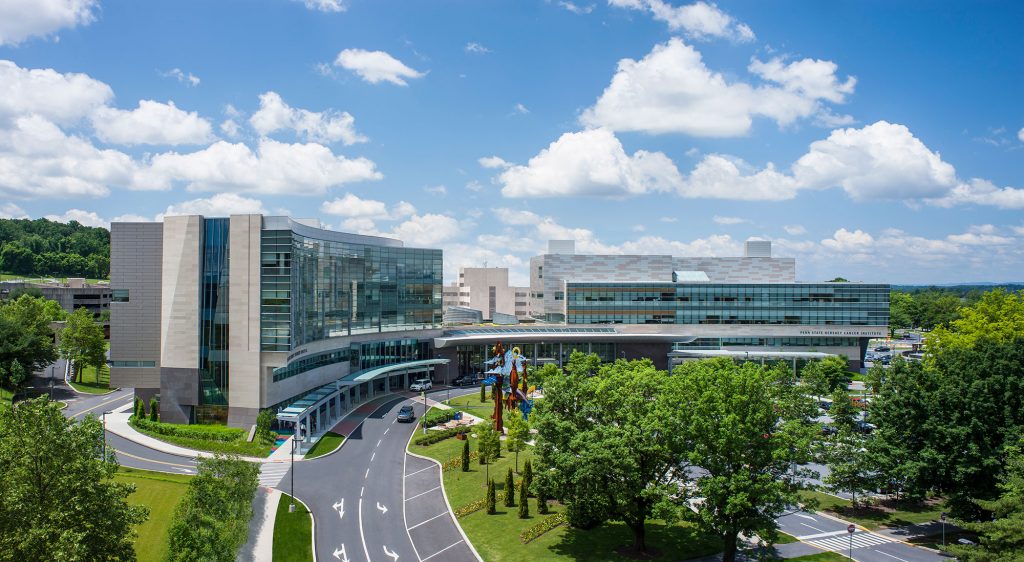Jump to topic
Search
Program Details
The Minimally Invasive Surgery, Abdominal Wall Reconstruction and Hernia Fellowship is a broad-spanning compilation of surgical cases, composed of open, laparoscopic, robotic, and endoscopic procedures. The fellow has diverse exposure to complex abdominal wall pathology in both an academic referral center as well as an affiliate community hospital. The fellowship consists of three abdominal wall core faculty at the primary academic site, Hershey Medical Center, plus exposure to a community-based complex abdominal wall practice at Hampden Medical Center (1-2 days per month). There is an opportunity to work with four other MIS faculty at Hershey Medical Center who perform a variety of hernia, flexible endoscopy, foregut, and bariatric procedures. Due to many patients’ complex surgical needs, frequent collaboration occurs with surgeons within surgical oncology, colorectal surgery, urology, vascular surgery, and pediatric surgery.
The fellow is appointed as an Instructor within the Department of Surgery. Clinical responsibilities include all aspects of care of the abdominal wall reconstruction patients, spanning from initial clinic evaluation, operative and in-hospital care, through post-operative visits. The fellow will attend or present at weekly educational sessions with attendings, medical students and resident learners, and mid-level providers with presentations on an MIS, bariatric, or abdominal wall topic.
The fellow has full attending privileges at the institution and is expected to take general surgery call, with faculty oversight, as part of their educational experience.
The Abdominal Wall Reconstruction and Hernia Fellowship is salaried, with salary guaranteed for the one-year duration of the position, which runs from August 1st to July 31st. Additional support is provided for CME including conferences and training labs.
Approximately 95 percent of the fellow’s time is spent in clinical activity, with the remaining 5 percent of time spent on research activity.
Facilities include a dry lab, as well as a Clinical Simulation Center. Penn State Health Milton S. Hershey Medical Center is an ACS-accredited education institution and a certified FLS testing center with four certified examiners on staff.
Learn More about the Fellowship
How to Apply
Fellows must have completed an ACGME-approved general surgery residency program or be fully trained surgeons eligible for unrestricted licensure to practice medicine in the Commonwealth of Pennsylvania.
The physicians entering into the fellowship are hired as faculty, not residents. Because of this, they must be U.S. citizens or hold H1B visas, O1 visas or green cards. To participate in the fellowship program, the fellow needs to obtain an unrestricted Pennsylvania license (MD license) and a federal DEA license.
Applications should be submitted online through the Fellowship Council. No curriculum vitae or applicants will be accepted outside of the Fellowship Council website. Please reference the Fellowship Council website for all dates, forms, and requirements.
Virtual Tour
Penn State Health
Penn State Health is a multi-hospital health system serving patients and communities across 29 counties of Pennsylvania. Its mission is to improve health through patient care, research, education and community outreach.
In December 2017, the system partnered with Highmark Health to facilitate creation of a value-based, community care network in the region. The shared goal of Highmark and Penn State Health is to ensure patients in the community are within:
- 10 minutes of a Penn State Health primary care provider
- 20 minutes of Penn State Health specialty care
- 30 minutes of a Penn State Health acute care facility
Learn more about Penn State Health

Penn State Health Children’s Hospital (left), Penn State Health Milton S. Hershey Medical Center (center) and Penn State Cancer Institute (right)
Penn State Health Milton S. Hershey Medical Center
500 University Dr., Hershey, Pa., 17033 (Derry Township, Dauphin County)
- The health system’s 647-bed flagship teaching and research hospital
- The only medical facility in Pennsylvania accredited as both an adult and a pediatric Level I (highest-level) trauma center
- Dedicated surgical, neuroscience, cardiovascular, trauma and medical intensive care units
- Accredited Life Lion critical-care transport providing more than 1,100 helicopter and approximately 750 ground ambulance transports per year
- More than 1,300 faculty members and more than 650 residents and fellows
- Approximately 29,000 admissions, 73,000 emergency department visits, 1.1 million outpatient visits and 33,000 surgical procedures annually
- Designated as a Magnet hospital since 2007
Learn more about Milton S. Hershey Medical Center
Penn State Health Children’s Hospital
600 University Dr., Hershey, Pa. 17033 (Derry Township, Dauphin County)
- An eight-story, 263,000-square-foot-facility built in 2013 and expanded in 2020
- 160 licensed pediatric beds, 26-bed pediatric intensive care unit and a 56-bed neonatal intensive care unit
- Level IV (highest-level) neonatal intensive care unit
- Level I quaternary (highest-level) pediatric intensive care unit
- Level I (highest-level) pediatric trauma center designation
- Intermediate care unit
- Dedicated pediatric operating rooms
- More than 150,000 pediatric outpatient visits, 20,000 pediatric emergency room visits, and approximately 5,000 pediatric patient discharges annually
Welcome to Hershey
More About Hershey
Interested in learning more about living and working in Hershey, Pa.? See details here:
Fellow wellness, including emotional, spiritual, social and physical health, is a crucial component to training and to becoming a professional, compassionate and resilient physician. Self-care is a skill which must be continually practiced and reinforced. Penn State College of Medicine and Penn State Health are committed to addressing wellness, with multiple resources readily available.
Institutional resources
Institutional Resources
Penn State Health and Penn State College of Medicine celebrate, embrace and support the diversity of all patients, faculty, staff, students and trainees.
Office for Diversity, Equity and Inclusion
In keeping with this, Penn State Health has an active Office for Diversity, Equity and Inclusion with various programs, networks and resource groups, including:
- Talks and lectures on diversity, equity and inclusion through the Inclusion Academy
- Regular events on topics such as eradicating racism and creating a culture of inclusiveness
- Many Business Employee Resource Groups (BERGs), including:
- Disability Business Employee Resource Group
- Interfaith Business Employee Resource Group
- LGBTQ+ Business Employee Resource Group
- Military and Veterans Business Employee Resource Group
- Multicultural Business Employee Resource Group
- NextGen Business Employee Resource Group
- Black Physician Professional Staff Association – Resource Group
- Hispanic Professional Association
- Asian Physician and Professional Staff Association
- International Workforce Inclusion
Learn more about the Penn State Health Office for Diversity, Equity and Inclusion
Learn more about the College of Medicine’s Office for Diversity, Equity and Belonging
Office for Culturally Responsive Health Care Education
The vision at Penn State College of Medicine and Penn State Health is to equip learners with the knowledge, skills and attitudes they will need to provide culturally excellent health care and research for an increasingly diverse U.S. population. The Office for Culturally Responsive Health Care Education was formed to help meet that goal.
Learn more about the Office for Culturally Responsive Health Care Education
Office for a Respectful Learning Environment
In addition, the institution does not tolerate discrimination, biases, microaggression, harassment or learner mistreatment of any kind, and any concerns are immediately addressed by the Office for a Respectful Learning Environment.
Learn more about the Office for a Respectful Learning Environment
Network of Under-represented Residents and Fellows
The Network of Under-represented Residents and Fellows (NURF) is a group of diverse residents and fellows representing all specialties. NURF’s goal is to promote cultural diversity in the residency programs through community involvement, mentorship with diverse faculty, professional networking and support for the recruitment of diverse medical students into the residency programs.
NURF is sponsored by the Penn State College of Medicine Graduate Medical Education Office and the Penn State Health Office for Diversity, Equity and Inclusion.
Latest News from Surgery







